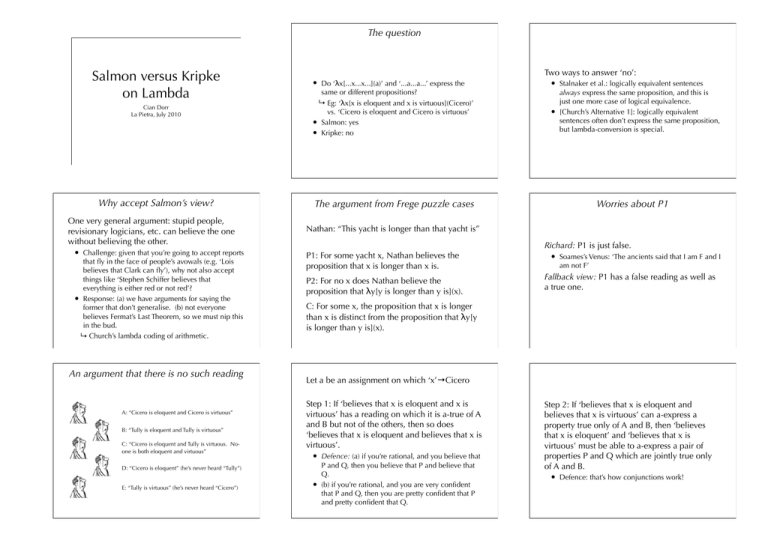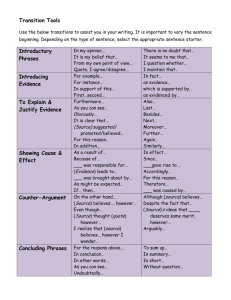Salmon versus Kripke on Lambda
advertisement

The question Salmon versus Kripke on Lambda Two ways to answer ‘no’: • Cian Dorr La Pietra, July 2010 Do ‘λx[...x...x...](a)’ and ‘...a...a...’ express the same or different propositions? ↳ Eg: ‘λx[x is eloquent and x is virtuous](Cicero)’ vs. ‘Cicero is eloquent and Cicero is virtuous’ • Salmon: yes • Kripke: no Why accept Salmon’s view? The argument from Frege puzzle cases One very general argument: stupid people, revisionary logicians, etc. can believe the one without believing the other. • Challenge: given that you’re going to accept reports that fly in the face of people’s avowals (e.g. ‘Lois believes that Clark can fly’), why not also accept things like ‘Stephen Schiffer believes that everything is either red or not red’? • Response: (a) we have arguments for saying the former that don’t generalise. (b) not everyone believes Fermat’s Last Theorem, so we must nip this in the bud. ↳ Church’s lambda coding of arithmetic. An argument that there is no such reading A: “Cicero is eloquent and Cicero is virtuous” B: “Tully is eloquent and Tully is virtuous” C: “Cicero is eloquent and Tully is virtuous. Noone is both eloquent and virtuous” • Stalnaker et al.: logically equivalent sentences always express the same proposition, and this is just one more case of logical equivalence. [Church’s Alternative 1]: logically equivalent sentences often don’t express the same proposition, but lambda-conversion is special. Worries about P1 Nathan: “This yacht is longer than that yacht is” Richard: P1 is just false. P1: For some yacht x, Nathan believes the proposition that x is longer than x is. P2: For no x does Nathan believe the proposition that λy[y is longer than y is](x). • Soames’s Venus: ‘The ancients said that I am F and I am not F’ Fallback view: P1 has a false reading as well as a true one. C: For some x, the proposition that x is longer than x is distinct from the proposition that λy[y is longer than y is](x). Let a be an assignment on which ‘x’→Cicero Step 1: If ‘believes that x is eloquent and x is virtuous’ has a reading on which it is a-true of A and B but not of the others, then so does ‘believes that x is eloquent and believes that x is virtuous’. • D: “Cicero is eloquent” (he’s never heard “Tully”) E: “Tully is virtuous” (he’s never heard “Cicero”) • • Defence: (a) if you’re rational, and you believe that P and Q, then you believe that P and believe that Q. (b) if you’re rational, and you are very confident that P and Q, then you are pretty confident that P and pretty confident that Q. Step 2: If ‘believes that x is eloquent and believes that x is virtuous’ can a-express a property true only of A and B, then ‘believes that x is eloquent’ and ‘believes that x is virtuous’ must be able to a-express a pair of properties P and Q which are jointly true only of A and B. • Defence: that’s how conjunctions work! Worries about P2 Step 3: For any property P a-expressible by ‘believes that x is eloquent’, if P is had by A, then P is had by D. For any property Q a-expressible by ‘believes that x is virtuous’, if Q is had by B, then Q is had by E. • One need not have any opinions about virtue to believe that I am eloquent! ‘For no x does Nathan believe that x is a thing which is longer than it itself is’. • • • This doesn’t work if indefinites are existential quantifiers. Then, if the sentence were equivalent to anything in Loglish, it would be ‘¬∃x (Nathan believes that ∃y(y = x and y is longer than y)’. The friend of Alternative 1 won’t think this expresses the same proposition as ‘¬∃x (Nathan believes that λy[y is longer than y](x)’. • • • • Does ‘Cicero is a self-denouncer’ express the same proposition as ‘λx(x denounces x)(Cicero)’? • • proposition as ‘λx[x=x](a)’. • • • One cannot stop believing that x is eloquent just by coming to accept “Tully is virtuous”. This is a Loglish sentence about which we can’t legitimately appeal to speaker’s intuitions. Are there any English sentences such that (a) they are intuitively false and (b) there is good theoretical reason to think them equivalent to that Loglish sentence? Conjunctive predicates? ↳ Kripke assumes ‘a is self-identical’ expresses same • P2 For no x does Nathan believe that λy(y is larger than y is)(x) Does ‘a is large and seaworthy’ express the same proposition as ‘(λx)[x is large & x is seaworthy](a)’? No clear reason to think so. Conjunction of predicates seems structurally distinctive and pretty simple. At least if you’re inclined to the view that ‘a is large’ expresses a different proposition from ‘λx[x is large](a)’, it’s hard to see why you’d think these were the same. Property-talk, set talk • • ‘Nathan believes that x has the property of being larger than oneself’ ‘Nathan believes that x is a member of the set of things that are larger than themselves’ ‣ Both have a kind of structure that ‘λy[y is larger than y] (x)’ does not have’. Reflexive pronouns ‘Self-’ • Step 4: For any property P a-expressible by ‘believes that x is eloquent’, if P is had by D, then P is had by C. For any property Q a-expressible by ‘believes that x is virtuous’, if Q is had by E, then Q is had by C. ‘Self-denouncer’ is a word: its complexity is morphological, not syntactical. It certainly doesn’t have anything like an open sentence as a constituent! A friend of “structured content” is liable to think that the content of the open sentence ‘x denounces x’ [what might this be!?] is a constituent of the content of ‘λx(x denounces x)’. • Lee criticised himself. Deng did too. Well known theory: the ambiguity in the discourses arises from ambiguity in first sentence, between ‘Leei [criticised himselfi]’ (‘himself’ not bound) and ‘Leei [λj [tj [criticised himselfj]]]’. ‣ Not just reflexives: ‘Lee apologised to everyone who criticised him. Deng did too’. ↳ At best this gives us ordinary language sentences that have readings that are equivalent to lambda sentences. ‣ ‘I had been hoping that I would meet myself!’ ‘Saul believes that Cicero denounced himself. Nathan believes that Catiline did’. ‣ Can we get a reading where they could both be in Frege puzzle cases? [I think so.] ‘Such that’ • • ‘Saul thinks that everyone who admired Cicero denounced Cicero’. ‘Saul thinks that Cicero is such that everyone who admired him denounced him’. First Kripke worry: necessary identity General concern: uses of the technology λabstraction in formal semantics are not motivated in a way that could justify claims of synonymy between ordinary language sentences and certain λ-sentences as opposed to other close logical equivalents. 1. x = x 2. □ x = x 3. x = y 4. □ x = y 5. x = y ⊃ □ x = y (axiom for identity) (necessitation) (assumption) (2, 3, LL) (3-4, ⊃intro) 6. ∀x∀y(x = y ⊃ □ x = y) (5, ∀intro) • • Kripke’s worry: what if someone rejected (2), and tried to make this more palatable by combining it with an acceptance of ‘□ x is self-identical’ / ‘□λy [y=y](x)’? Response: that would be a bad view. So? Although the view seems crazy (at least if ‘□’ is interpreted as ‘it is metaphysically necessary that’), it’s kind of an interesting view all the same. • NB: it gets to keep full strength Leibniz’s Law: ∀x∀y (x=y → (....x.... ...y...)). • E.g.: a variant of counterpart theory that forgets about the difference between repeated variables and new variables. Second Kripke worry: too many propositions Might something like this be right for ‘epistemic necessity’? • Not if ‘it is epistemically possible that P’ means something of the form ‘relevant people don’t/ couldn’t know in relevant ways that not-P’. ‣ Salmon: we can know a priori that Hesperus is Phosphorus. • But what if ‘it is epistemically possible that P’ meant something like ‘relevant people do/could permissibly have not-too-low credence that P’? ‣ Rationally ideal people could have high credence that Hesperus isn’t Hesperus. What about Salmon’s argument using ‘definitely’? • • Williamson: ‘Definitely P’ means something a bit like ‘People who were idealised in such-and-such ways would know that P. ↳ This makes ‘Definitely x = x’ true. Williamson-like view: ‘Definitely P’ means something like ‘People who were idealised in suchand-such ways would not have a positive credence that P’. ...a... λx[...x...](a) λx[λy[...y...](x)](a) λx[λy[λz[...z...](y)](x)](a) ↳ Then it might not be determinate that x=x, if x has guises to which the obstacles apply. Third Kripke worry: propositional functions ...a... ∃x(...x... ∧ x = a) ∃x(∃y(...y... ∧ y = x) ∧ x = a) ∃x(∃y(∃z(...z... ∧ z = y) ∧ y = x) ∧ x = a) '(a) The very term ‘propositional function’ clearly suggests that Russell did not intend any distinction between λxφx(a) and φ(a). Nor does a mathematician analogously intend any distinction between λx(x!)(3) and the number 6. Nor did Church, inventor of the lambda notation, intend any such distinction.... (a′) Consideration (a) above strikes me as correct in terms of the truth, not just for Russell.' A reconstruction (?): 1. ‘λx(x!)(3)’ and ‘3!’ denote the same thing. 2. So ‘λx(x!)(3)’ and ‘3!’ designate the same thing. 3. So ‘λxφx(a)’ and ‘φa’ designate the same thing. 4. So ‘λxφx(a)’ and ‘φa’ express the same proposition. Salmon rejects the step from 3 to 4. • ‘The slingshot’: if the notion of “designation” is compositional, and coreferential singular terms (complex or simple) “designate” the same thing, then sentences with the same truth value “designate” the same thing. Russell is committed to rejecting the step from 1 to 2. • Genuinely singular terms—at least of the sort needed to run the slingshot argument—are impossible. Could we stipulate that λ-abstracts behave in the way Kripke wants? • • No reason why not. So long as we don’t have higher-level predicates or anything like that, we can treat it as a cumbersome notational variant. If the originators of the notation had said that they wanted it to work like this, we could defer to them. A semantics on which the semantic values of lambda abstracts are functions from objects to propositions: |λxφ(t)|a = |λxφ|a(|t|a) |λxφ|a(z) = |φ|a[‘x’→z] • e.g.: |λx[x denounced x](Cicero)| = |λx[x denounced x]|(Cicero) = |x denounced x|[‘x’→Cicero] The idea that the semantic values of predicates in general are functions from objects to propositions should seem alien to lovers of structured propositions. • • Standard picture: the semantic value of a sentence is a structure having as constituents the semantic values of syntactic constituents of the sentence. Can the domain of a function include a structure that has that very function as a constituent?




